‘Dispatchers are the first of the first responders’
Whitcom 911 dispatchers reflect on calls following National Public Safety Telecommunicators Week
Whitcom celebrated its 25th anniversary last week. Executive director Wendy Berrett said Whitcom has 13 full-time dispatchers, two part-time dispatchers and two more are in training.
April 22, 2021
Emergency dispatchers are trained to operate six computers, four speakers, one headset and handle multiple callers all at once. Last year, Whitman County Regional Communications Center 911 answered over 92,000 service calls, 30,000 911 calls and 80,000 non-emergency calls.
Whitcom celebrated its 25th anniversary last week during National Public Safety Telecommunicators Week. Whitcom executive director Wendy Berrett said they had small celebrations during the week. But their work does not end before or after that week.
Whitcom dispatches for Whitman County — including Pullman and WSU Pullman — Asotin County, Clarkston, Moscow — including the University of Idaho — and the Nez Perce Tribe, which spans across five counties in Idaho. Berrett said they cover about 74 agencies.
“There’s no perfect test to test for a dispatcher,” Berrett said. “Every once in a while, somebody still doesn’t make it through training, and we have to let them go.”
Whitcom has 13 full-time dispatchers, two part-time dispatchers and two more are in training. Ideally, there would be 22 full-time dispatchers, but understaffing is common in a lot of dispatch centers in the country, Berrett said.
Berrett was a volunteer firefighter and emergency medical technician for the Moscow Fire Department while she attended UI. While she was looking for a job after graduation, her training director told her she should apply as a dispatcher.
Berrett began dispatching in Moscow in 1998 and she soon met her husband Tyson who was a police officer for the Moscow Police Department. Dating was not allowed between employees, so Berrett said she decided to transfer to Whitcom in 2000.
Berrett, who is now 49 years old, still lives in Moscow. She said she came to the town to attend UI all those years ago and just never left.
Lukas Meader was hired as a dispatcher July 2019. Meader, who is 22 years old, grew up in Snohomish, Washington and moved to Pullman for school in 2017. He completed two years at WSU and was in the Pullman Fire Department’s reserve program, which is where he became familiar with Whitcom.
Meader was halfway through training, which he began in December, when lockdown for the pandemic really began. Because of this, he said he has not experienced dispatching for the Pullman area during football season or even a day where most students are on campus.
Training takes about six to eight months, Meader said, but he finished it in four months with the help of his previous first-response background. After dispatchers finish training, they have a year probationary period, which Meader finished earlier this month.
Emily McInturff, who is 23 years old, began dispatcher training in April 2020 and finished September 2020. McInturff said she grew up in Pullman where she still lives with her two-year-old son.
McInturff said she works about 52 hours a week and is on the day shift, but she is switching over to the night shift soon.
Training is difficult, McInturff said. She went through four different instructors who each led their own specific phase. McInturff said she learned how to ask questions one at a time and how to calm down emotional callers. She also needed to learn the geography of every place Whitcom dispatches for.
“Something’s going on in my headset and something’s going off on my radio at the same time,” McInturff said. “I have to not be able to listen to both at the same time but be able to bounce back and forth and get an idea of what’s going on if I’m not hearing both things at once.”
Berrett said dispatchers learn to develop a “radio ear” that allows them to monitor what officers and responders are saying through the radio as well as what a caller is saying at the same time.
Whitcom dispatchers are currently working 10-12 hour shifts three or four times a week. There are usually about three or four Whitcom dispatchers working at one time, Berrett said.
Whitcom dispatchers are all emergency medical and emergency fire dispatch trained, Berrett said. This means they call for the fire department and ambulance themselves instead of handing it over to another agency, which is commonly done in other dispatch centers. Whitcom dispatchers can walk callers through CPR, childbirth and the Heimlich maneuver.
Meader said some calls they deal with are very specific. More than once, Meader said he got a call from an older resident because their husband was not breathing. He guided the caller through CPR, counting together, and everything seemed like it was going well. But when first responders arrive, they see the caller performing CPR on a houseplant or couch.
“There was no way for us to tell that it wasn’t a real person,” he said.
Other calls are more humorous, albeit awkward, Meader said.
“There have been a handful of times where people have called because they are stuck in their own personal handcuffs and an officer [has] to come with a handcuff key,” he said.
Full moons, for some reason, tend to result in not only an uptick in calls but some really strange ones as well, Berrett said.
McInturff said they track the full moon on their office calendar.
“People will just go off their rocker a little bit. And they’ll just call in, tell us crazy stories for a little bit, and then they’ll call again the next day about that same call and sound totally normal,” she said.
Regular calls become a little off during full moons, she said. Dispatchers frequently get calls about domestic disputes, but on full moons, sometimes the caller will fixate on little details like the colors of a person’s shoes while giving the normal information dispatchers ask for.
Callers also get a little defensive during the full moon, McInturff said.
“I’ll ask for their date of birth and they’re like ‘Why do you need that?’” she said.
But dispatchers frequently, regardless of the fullness of the moon, get non-emergency callers who answer their own questions while asking the question. McInturff got a caller once who asked how long they could park in a ten-minute parking spot.
McInturff said she has also gotten callers asking if Starbucks is open. At that point, she can only recommend that the caller call Starbucks themselves.
Calls can often vary by region, McInturff said. They have a computer folder labeled “cow,” which lists cow owners in every area, so dispatchers can quickly find the owner if a cow gets out — it happens often.
“It’s pretty much a daily call. Everybody has a cow, and they might get out in the road,” she said. “Well, cows got out again.”
McInturff said they also tend to get a lot of calls during agriculture season when farmers are conducting controlled burns on their fields.
Loose moose in Moscow, Idaho, also tend to lead to a lot of calls, she said.
“We usually tell them, you know, just try and leave the moose alone,” she said. “If he’s doing anything dangerous, definitely call us, but we just like to keep track of them.”
Sometimes they get callers who are angry at the world and just need to swear at someone, McInturff said. Dispatchers just have to deal with that, but sometimes their word creativity is impressive, she said.
They also sometimes get callers who just want to chat a little, she said. If the dispatch center is not getting a lot of calls, they have no issue talking to people on the phone for a while.
Some other calls are misunderstandings, Meader said. He was working one night and nearly 150 calls came in within 10 minutes.
“Most people were like ‘Oh my gosh, I’m hearing gunshots,’ you know, and it’s like ‘Nope, sorry, it’s fireworks going off,” he said.
But that does not mean dispatchers can become complacent with those calls, Meader said. They always have to take everything the way the caller is presenting it to them because, one day, it might be gunshots, and an improper response would fall back on them.
Meader said the hardest calls are the ones that make him feel helpless.
“If you were there with them, you could help them, but you’re not,” he said. “You’re really a phone, you’re a phone in their hand, and there’s not a lot you can do as a phone in their hand.”
The hardest calls for McInturff are ones that involve children. She said she got a call from a 12-year-old girl who had contacted a crisis hotline because she was being sexually abused by her mother’s boyfriend and his friends.
The girl was locked in her room and she could not leave. All the information she was providing, from her name and age to how the outside of her house looked like, matched Whitcom’s databases. Police were dispatched, but they did not find her, McInturff said.
“There’s no way to know if that was actually happening, but it’s just knowing that she had called for help, and we had tried to help her,” McInturff said. “Everything made sense, and they weren’t able to find her. And so she’s probably still out there somewhere — needing help.”
During those calls, McInturff said she shuts off her emotional side.
“This is me right now. This person needs my help. This is what I can do,” she said.
Later, when she gets into her car after work, she will let it out and cry. She said she knows she cannot ever let it fully go, but she knows she did everything she possibly could to help, and she will go back the next day and do her best again.
One of the hardest parts of the job is not knowing what happens to a caller after police, medical or fire is dispatched, Meader said. But local first responders are pretty good with following up with dispatchers after a big call, like one that resulted in CPR, and answering questions if dispatchers need answers.
Programs like Critical Incident Stress Management are available to dispatchers and other first responders for cases that are particularly stressful, Meader said. He has not had to attend one, but he said he appreciates having the option available.
One of Meader’s biggest support systems is his coworkers. He has been working night shifts, 7 p.m. to 7 a.m., but he will be switching over to day shifts soon. He said this works out great for him because he is moving from Pullman to the Palouse for more of a “small-town vibe.”
McInturff said her coworkers help her. They will get her a donut or some coffee and check in with her. She said her coworkers are incredible people.
“We all experienced the same thing … we can all listen to each other’s phone calls,” she said. “Even if you don’t hear like three dispatchers listening to one call, there might be.”
The COVID-19 pandemic has affected Whitcom, but not as much as one would expect. Berrett said calls have decreased a little. There are some additional questions dispatchers have to ask callers who request medical help, and they get calls about people not wearing masks or social distancing. The biggest change, she said, is the dispatch center being completely closed to visitors.
Whitcom has been lucky, she said. None of the dispatchers have gotten COVID-19. While in the call center, dispatchers do not wear masks, but their workstations are six to eight feet apart from each other.
Dispatching is a thankless job, Berrett said, and dispatchers often have to praise themselves and their coworkers because it is uncommon for other people to do it for them. But sometimes, they get a phone call or letter from a caller they helped, and that is a big deal to all of them, she said.
“The big thing is, you know, dispatchers are the first of the first responders,” she said. “People don’t see us, but we’re the ones that coordinate everyone else.”
*Editor’s note: This story has been updated with the correct number of calls Whitcom answered last year.








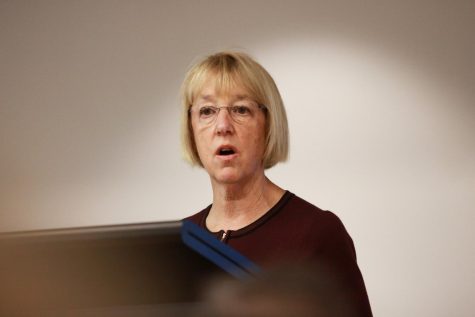

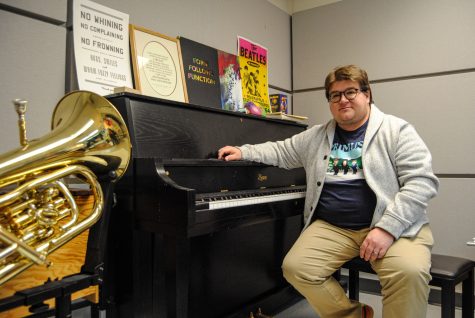
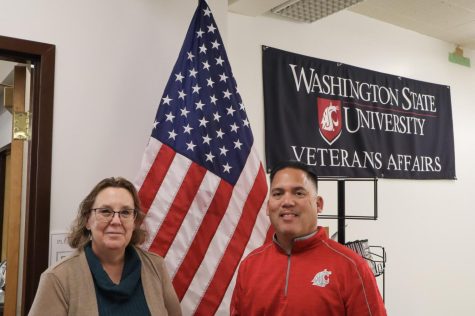
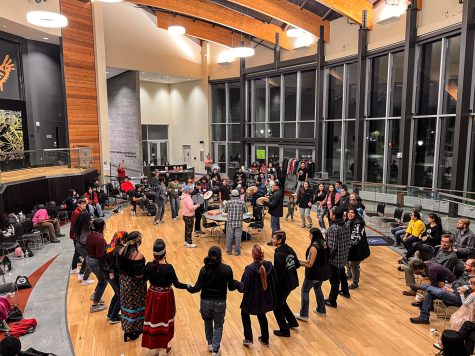

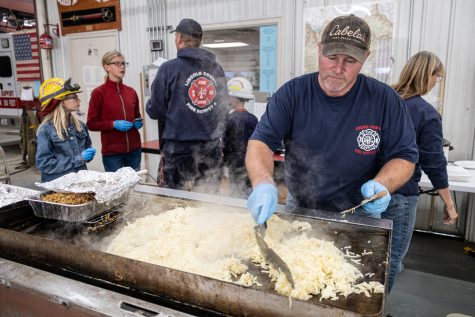


Michael Floyd • Apr 22, 2021 at 5:43 pm
Jayce,
Well written article. Excellent job re-telling the dispatchers’ stories. Nice job.